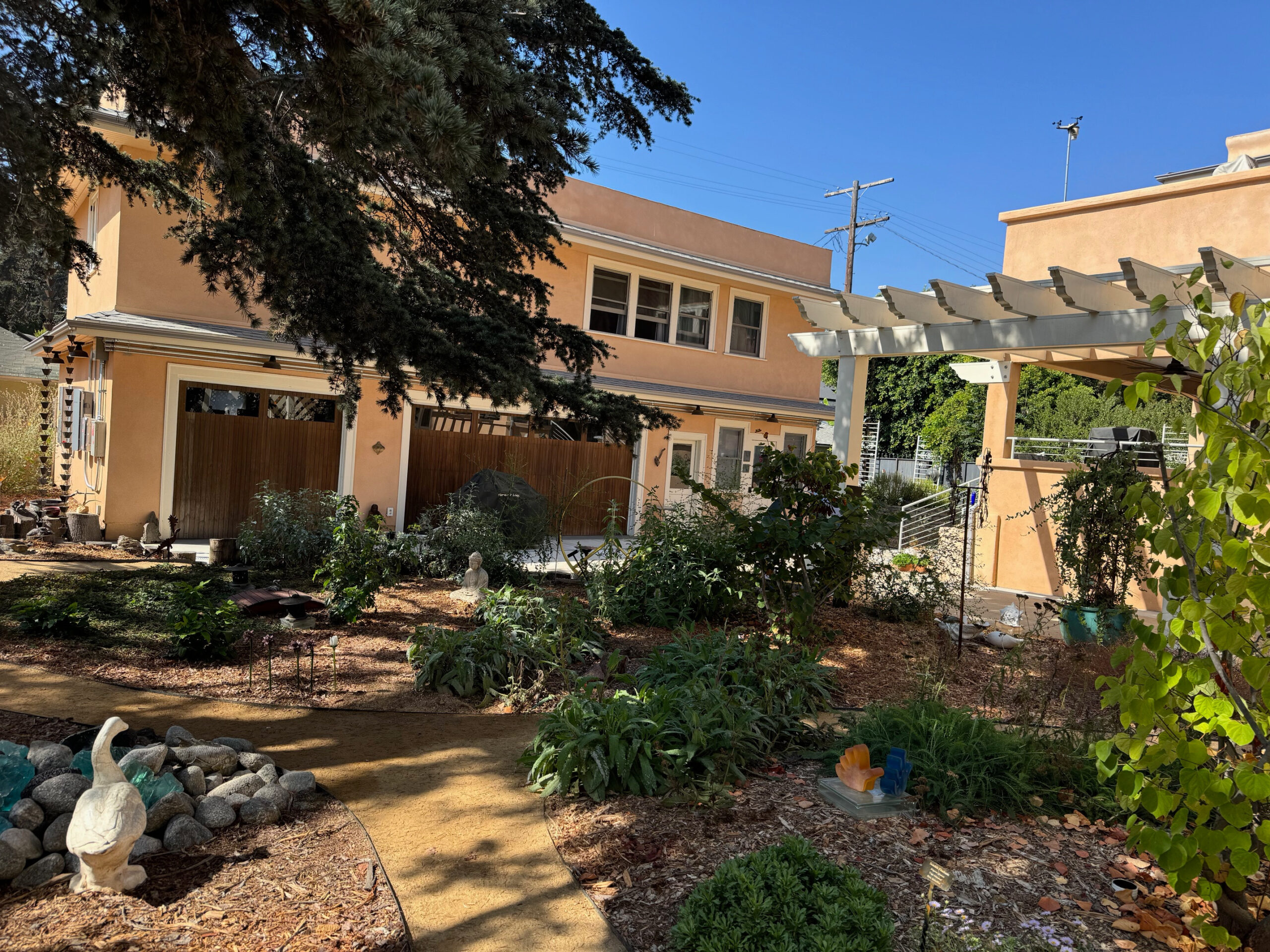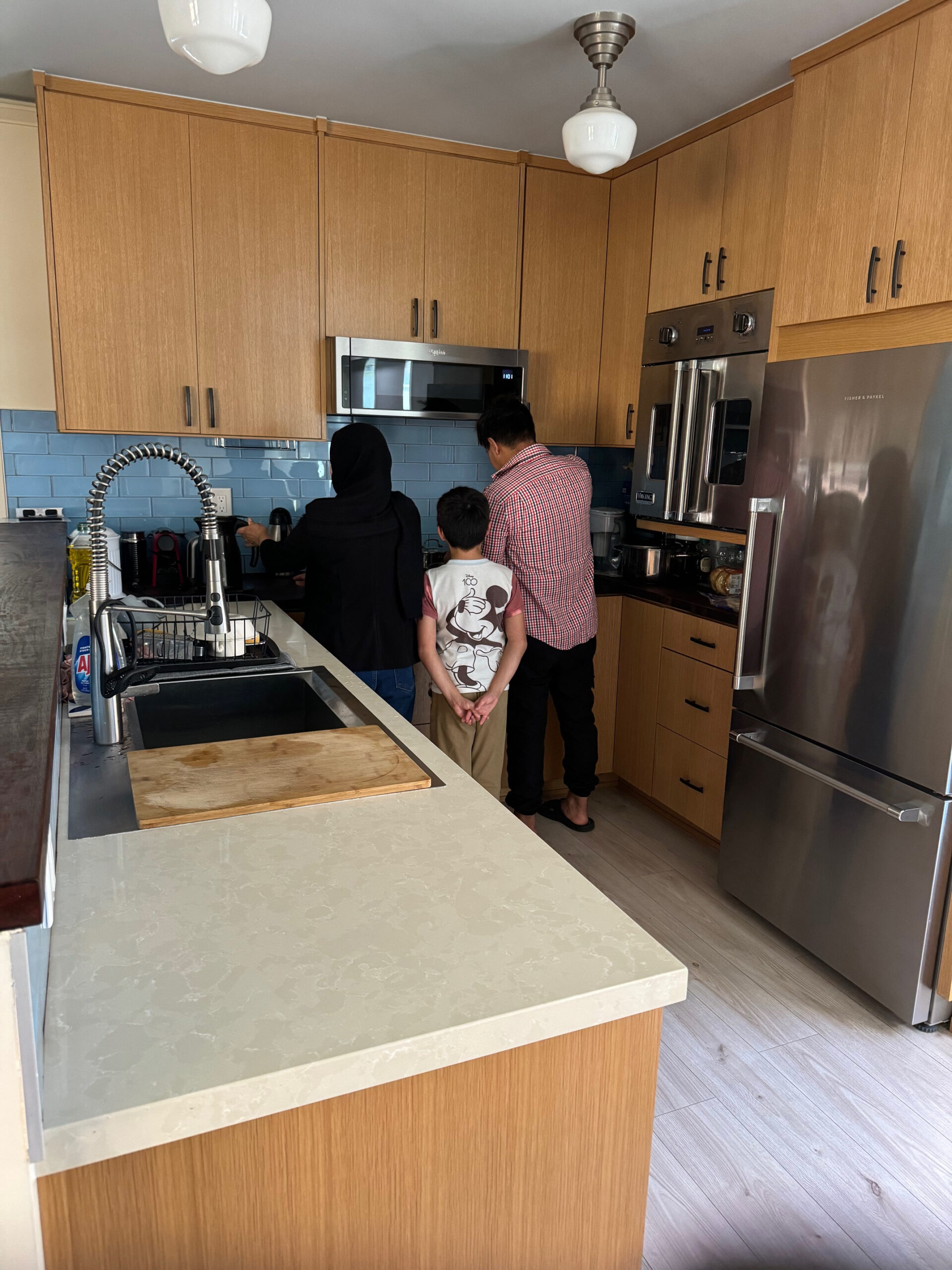
by Liz Bar-El, CLUE Communications Liaison
This story continues our series highlighting CLUE’s work to build a network of faith partners to arrange and offer shelter to migrants arriving to the LA region, including those who are walk-in clients of our LA Welcomes Collective partner organizations and those sponsored by CLUE for release from inhumane detention centers.
Lore Hilburg and Reggie Jones live in their lovingly restored Mediterranean Revival home in Lafayette Square, which they purchased five years ago as a fixer-upper. In the backyard, they decided to build a two-bedroom accessory dwelling unit (ADU) over their garage, initially for Lore’s sister. When plans changed, Lore considered how she could best use the unit that was now ready for occupancy. Reading news stories of the housing crisis and the plight of arriving migrants in need of shelter, she decided that offering the space to a recently arrived family would be the best use of this beautiful unit.

Lore reached out to a neighbor, a member of Rabbi Susan Goldberg’s Nefesh congregation. Based in Echo Park, the congregation is an active partner and supporter of CLUE’s immigrant solidarity mission. CLUE members helped make the connection with CHIRLA (The Coalition for Humane Immigrant Rights) staff, who were looking for safe shelter for an Afghan mother and her two sons, an adult and child. On December 7, 2023, Fazela and her sons moved to the ADU in Lafayette Square.
Fazela, and her older son Mahdihave graciously shared their asylum journey with us.
The “A” Family
It has been 3 years now since the Taliban took control and the US forces left Afghanistan on August 27, 2021. The retreat involved a desperate and chaotic attempt to evacuate Americans and local population who worked with them, knowing that those left behind would be in grave danger. Those who managed to get on planes provided by the Coalition forces (US and other allies) would have access to travel to the US or other destinations. But for many others, the only path to safety would be through Pakistan or Iran, with much uncertainty about the next steps.
Akram A., Fazela and their five children are Hazara, an ethnic minority that has long faced discrimination and was persecuted by the Taliban during its reigns of terror over the country. During the years of the US/Alliance-supported democratic government, Fazela worked for an American educational NGO (PAD), while Akram worked as a house painter, including for some American clients. When the Taliban took over in August 2021, both were endangered due to their contact with the Americans. The younger generation felt completely broken by the developments.
Assisted by the NGO’s manager, the A family applied online for visas to Pakistan. One month later, the visas arrived and they drove to the border in early November. Chaotic border scenes kept them sleeping by the crossing gate for three nights, after which the gates opened and they crossed to safety.
They were given shelter in a safe house arranged by the NGO, who helped them apply for refugee visas to Brazil. Along with other NGO employees and their families, they totaled72 people altogether. On March 3, 2022, they arrived in Brazil, one step closer to their goal of resettlement in the United States.
At this point, the NGO was not able to help them further, and they joined the application queue for refugee entry – a process that can typically take years. Most of the group left within a month or two on the trek northward to the US-Mexico border.
The A family remained longer, with Akram finding some work in painting. But in June 2023, they decided that it was time to leave for the US. With limited funds available, they chose Fazela and the two sons, Mahdi, 21, and Jawad, 7, to make the trip. The plan was for them to arrive in the US and then sponsor Akram and the three daughters, Maryam, Mahnaz and Zahra, to join them as soon as possible.
The Journey North
Between June and September 2023, Fazela and her sons traveled through 14 countries.
In Colombia and in Oaxaca, Mexico, corrupt police demanded bribes. Forced to get off of a bus to speak with police, a bus driver drove off with all of their belongings.
“I saw things I never thought I would see in my life.
Mahdi
I saw people die in front of us in the Panama jungle.”
But in addition to cruelty and abuse, Fazela and Mahdi spoke of moments of kindness that gave them hope for survival. In one town in Mexico, a kind woman saw Fazela crying on the side of the road as she stopped to fill up her car with gas. At that point they had not eaten for two days, and she bought them hamburgers. Jawad ate it so fast, she bought him another. The woman gave them shelter, and helped them on their way.
In Oaxaca, left with nothing, UN personnel found them and gave them shelter and papers, putting them on a bus to Mexico City, where they were given shelter and food for 25 days. During this time, they applied for a CBPI visa, an extensive process with a long waiting period. Rather than remain indefinitely in Mexico City, they traveled to the Tijuana border, entering the US on September 3rd.

Safe Shelter at Last in LA
From the border, Jewish Family Services transported them to a hotel in San Diego, where they remained for 2 ½ months. They were well cared for, but found the environment to be restrictive for them, not knowing how long it would take to receive documents that would allow them to begin their new life.
Transferring to a shelter in Indio, they remained for a month and a half until a fellow traveler connected them with Daoud from CHIRLA. As they registered for case management with CHIRLA, CLUE was contacted to help find a longer-term shelter option. The chance encounter then led them to Lore Hilburg and Reggie Jones.
Today, Fazela, Mahdi and Jawad are safe. Jawad has started school and is thriving. Mahdi and Fazela have received work permits and are actively looking for jobs. Although Fazela is getting her life together without Akram and the three girls, she and her sons are in constant emotional turmoil.
Recently, Lore and Reggie have been preparing an application through Welcome Corps (see related story about Welcome Corps) to reunite the family. This may take many months, but with hope of reuniting on the horizon, life may finally get back to normal for the A family, thanks to the generosity and goodness of their hosts, and the compassion of CLUE, CHIRLA and others working to connect resources with people in their time of greatest need in a new place they hope to call home.
NEXT WEEK: Liza’s story of flight from Afghanistan, refuge and the challenges ahead.
Donation Opportunity
Help raise the final $4000 to reunite the Mosawi family. Click here to donate and see more about their story.